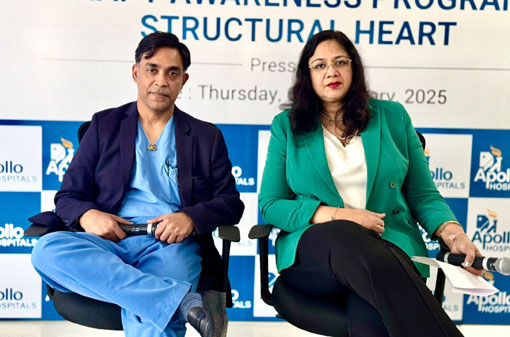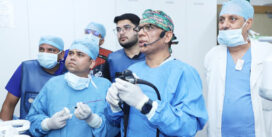Life-Changing Heart Procedure Restores Health of Elderly Patient in Indore

Indore, 6th February 2025: In a remarkable breakthrough in structural heart disease treatment, a 93-year-old patient from Raipur has undergone the life-changing, non-surgical procedure of Transcatheter Aortic Valve Replacement (TAVR) at Apollo Hospital Indore. This pioneering treatment has dramatically improved the patient’s quality of life, marking a significant milestone in cardiac care for elderly patients in Central India. The procedure, led by Dr. Roshan Rao, Senior Cardiologist, Apollo Hospital, Indore and Dr. Sarita Rao, Senior Cardiologist, Apollo Hospital, Indore eliminated the need for open-heart surgery, offering a life-changing solution for patients at high risk for traditional surgery.
Upon evaluation, Dr. Sarita Rao, Senior Cardiologist at Apollo Hospital Indore, shared, “The patient was urgently airlifted to Apollo Hospital Indore due to the critical nature of his condition. His health had deteriorated significantly, and he had become mostly bedridden, requiring frequent hospital visits. Given the high risk of traditional surgery, we had to act quickly. After undergoing the TAVR procedure, the transformation was incredible. Within just one day, he was up and moving, and soon after, he returned home. His recovery was nothing short of miraculous, he went from being unable to leave his chair to walking around his farm without any surgical scars.”
This case underscores the life-changing potential of TAVR, providing elderly patients with the opportunity to regain their independence and dramatically improve their quality of life.
Dr. Roshan Rao, Senior Cardiologist at Apollo Hospital Indore, added, “The introduction of advanced heart treatments like TAVR is truly transforming cardiac care in India, particularly for elderly patients who were once considered too high-risk for traditional surgery. The minimally invasive nature of TAVR involves only small incisions, minimizing pain, reducing recovery time, and decreasing the risk of complications like infections or excessive bleeding. As a result, patients experience a much faster recovery compared to traditional open-heart surgery.”
He further explained that the patient had been suffering from aortic stenosis, a condition where the aortic valve narrows and restricts blood flow from the heart to the rest of the body. This narrowing makes the heart work harder and can lead to symptoms such as chest pain, fatigue, and shortness of breath. If left untreated, aortic stenosis can lead to severe heart complications.
The growing awareness of heart diseases, paired with early detection and advanced diagnostic tools, has been pivotal in improving patient outcomes. As structural heart diseases, particularly aortic valve issues, become more prevalent with aging and genetic factors, early warning signs like breathlessness, chest pain, fatigue, and dizziness must not be overlooked. Modern diagnostic tools, such as echocardiograms, allow doctors to detect these conditions early, offering patients more opportunities for effective and timely treatment, including minimally invasive procedures like TAVR.
As cardiac care continues to evolve in Indore, the focus remains on patient-centric treatments and the integration of cutting-edge technologies, paving the way for improved outcomes. With the advent of next-generation valves and the use of artificial intelligence (AI) in diagnostics, the future of heart care in the region looks promising.
To further improve outcomes for patients across the country, the SMART trial evaluated different valve types used in TAVR procedures, enhancing treatment strategies, safety, and long-term success. To revolutionize cardiac care and improve patient outcomes, India must adopt a comprehensive healthcare approach that integrates advanced diagnostics and innovative treatments like TAVR.


